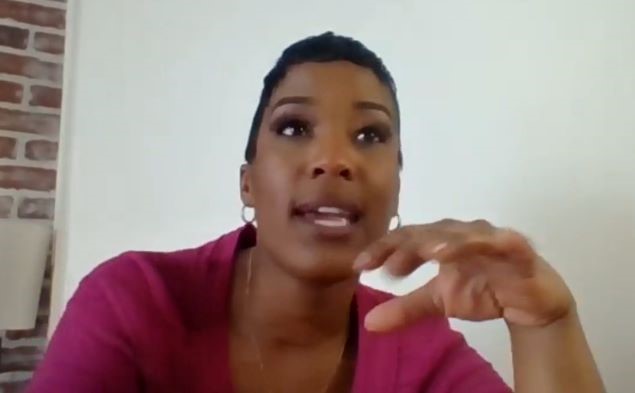‘January was interesting month,’ D.C. reporter says
By: KRISTIAN GREENE and TRUC NGYEN
Mar 06, 2021

Megan Rivers speaks on Feb. 2 via Zoom. (Panther photo by Kristian Greene)
Megan Rivers, a reporter with WUSA-TV Channel 9 in Washington, D.C., has found herself involved in covering major stories in the nation’s capital.
Beyond the pandemic and protests during 2020, the 2010 Claflin graduate most recently was part of coverage after violence at the U.S. Capitol. “January was a really interesting month,” she told Panther reporters about her experiences during a Zoom conference on Feb. 2.
“When the insurrection happened, I was off from work. I don’t think anyone could have predicted it would become what it became,” Rivers said.
Rivers said family and friends contacted her about her safety.
“My phone started blowing up and everyone was like, ‘Oh my God, be safe,’” Rivers said. “Every reporter, especially in D.C., went into instant breaking-news mode.”
Her primary reporting role was following up the story on the morning of Jan. 7 when her work day began. She interviewed people in areas around the city, such as at hotels.
“I was in the Starbucks line in the hotel, and just listening to the conversations that the people who participated in the events the day before were having was mind-boggling,” Rivers said.
“The whole thing didn’t make sense,” she said of the events of Jan. 6 that resulted in deaths, damage to the Capitol and arrests.
She said one woman she talked with said she was involved because didn’t believe the 2020 election results. The numbers changed too drastically and quickly.
“Sadly the conversation ended shortly after that” when another person appeared and said the woman should not be talking with the reporter.
Rivers said all the unrest in Washington has affected its people. “It looks like a militarized zone.”
Noting that many do not realize how national events affect the people of Washington, Rivers cited the presence of the National Guard as making people’s routines anything but routine. “It looks like a militarized zone.”
Her station’s primary audience is the people of Washington. “It’s weird when national news is our local news.”
Rivers works a 3 a.m.-11 a.m. shift as a reporter and traffic reporter.
“My first alarm goes off at 1:45 a.m. I have to be at work by 3 a.m., and I have to be TV-ready by 4:25 a.m.,” Rivers said.
"Currently, I am a morning reporter in D.C, fill in for traffic anchor, and fill-in anchor,” Rivers said.
During the COVID-19 pandemic, a lot of work has been pushed to home to follow the protocol. That has meant adjustments.
“As a reporter, not only do I have to work from home, but I also have to use my phone to read the scripts, check different social media sites for updates and news outlets.”
Rivers continues to stress, as she has done in previous sessions with Claflin students, that her mission as a journalist is to report facts and news.
She is concerned that CNN, MSNBC and Fox no longer stress objectivity in reporting. “They have gone away from journalism.”
There are times when she has to face unknown circumstances, leading her to on-scene controversies.
“When people are looking for an argument or something like that, I just don’t have what to give you. I am willing to have a conversation and I will try to understand your point of view. But my job is also to educate you or what is fact. And if you chose not to accept it, that is out of my control,” Rivers said.
Rivers detailed her diverse work history, telling students about her time in radio, freelance reporting and producing. She previously worked as a producer and reporter for television stations in Columbia and Charleston.
She urged multimedia students to take advantage of local opportunities, expand their networks, reach out for expert workshops and improve their communication skills.
Encouraging students
Washington, D.C., journalist Megan Rivers encouraged students to tell her about their career aspirations, offering advice to students on potential pathways to success.
After a student told her about his interest in film writing and producing, she insisted he should follow his passion, citing her own experiences working jobs she did not enjoy as a testimony.
“I was a producer for 3-1/2 years, and I was miserable for like three of those years,” she said.
Another student explained to Rivers about aspiring to work in photography.
“There is a real need for women photographers,” Rivers said. Use your minority status to your advantage, It works.”
Rivers told students they should seek the right opportunities for them, insisting doing what they are passionate about is the best way to go.
“Go and chase your dreams while you’re broke,” Rivers urged. Once you buy cars and get other bills, you are obligated to making money.
“I believe things come together in the right time if it’s right for you,” she said.